Anthropology News Archive | 2018
-
News | 2018
-
Using donated bodies to understand funerary archaeology
Dr. Wescott and colleague Hayley Mickleburgh from Leiden University published the results of their actualistic experiment examining joint disarticulation patterns in a seated burial and discuss the results. The research was published in the Journal of Archaeological Science: Reports.
-
Validation of Total Body Score/Accumulated Degree Day Model at Three Human Decomposition Facilities
Dr. Wescott along with four current and former Texas State students and colleagues at Sam Houston State University and the University of Tennessee published a paper in the new "Forensic Anthropology" journal examining the validity of the TBS/ADD model. This is the first collaborative research project involving three human decomposition facilities.
-
Texas State anthropologists publish paper in the Journal of Human Evolution on the Nariokotome Boy
In the August, 2018 issue of the "Journal of Human Evolution," Drs. Deborah Cunningham and Daniel Wescott, along with their collaborators, published a paper entitled "The effect of ontogeny on estimates of KNM-WT 15000's body size." The 1.5 million-year-old Homo erectus specimen KNM-WT 15000 (Nariokotome Boy) has played a critical role in our understanding of body size evolution. New interpretations suggest that KNM-WT 15000 had a younger age-at-death and a more rapid ontogenetic trajectory than previously suggested. Recent fossil discoveries and new interpretations suggest a wide range of body size and shape variation in H. erectus. Based on these new insights, we argue that KNM-WT 15000’s adult stature and body mass could have been much smaller than has been traditionally presented in the literature. Using chimpanzee and modern human growth trajectories, we bracket the range of possibilities for KNM-WT 15000’s adult body size and argue that the Nariokotome Boy was near the mean rather than among the largest known H. erectus specimens.
-
Texas State anthropologists publish paper on using computed tomography in forensic anthropology
Drs. Deborah Cunningham and Daniel Wescott, along with recent MA graduate Devora Gleiber and colleagues at the Federal Bureau of Investigation, published a paper in the brand new journal "Forensic Anthropology" entitled "The use of x-ray computed tomography technologies in forensic anthropology."
-
Dr. Kent Reilly Receives Grant
Congratulations to Dr. Kent Reilly who was recently awarded a Lannan Foundation Community and Ethnographic Studies grant for over $18,000.
-
MA Student, Alejandro Allen, awarded NSF Grant
Cultural anthropology MA student, Alejandro Allen (Advisor Dr. Nicole Taylor) has been awarded an REG (Research Experience for Graduates) grant from the National Science Foundation to study how college students experience food insecurity.
-
Dr. Carolyn Boyd to Participate in the 2018 Rock Art Colloquium
Congratulations to Dr. Carolyn Boyd who has been invited to participate in the 2018 Rock Art Colloquium this summer, sponsored by the Getty Conservation Institute. The attendees are leaders in rock art conservation and management from around the world.
The report from the first (2015) colloquium is available for download from the Getty Conservation Institute site.
-
CAS Welcomes New Associate Director
Congratulations to Dr. Jodi Jacobson who has been chosen as the new Associate Director of the Center for Archaeology Studies. Jodi comes to CAS from TRC in Austin where she was a Senior Archaeologist, Project Manager, Office Practice Lead, National Program Director for Tower Environmental Compliance, and Central Region Market Director.
-
Dr. Jill Pruetz and one of her students from Iowa State made the NY Times front page!
This piece is based on their paper, “The costs of living at the edge: Seasonal stress in wild savanna-dwelling chimpanzees,” published in the Journal of Human Evolution.
-
Texas State and BLM are New Mexico Partners in Preservation
The Cross Bar Ranch Field School at Texas State was highlighted on the Bureau of Land Management's New Mexico Preservation Partner's in Preservation web page. Dr. Britt Bousman has been teaching an archaeological field school at the Cross Bar Ranch in the Texas Panhandle since 2004. He is instructing student, Olivia Adams, on mapping with a Total Station in 2016.
-
Anthropology student chosen for Three Minute Thesis (3MT) regional competition
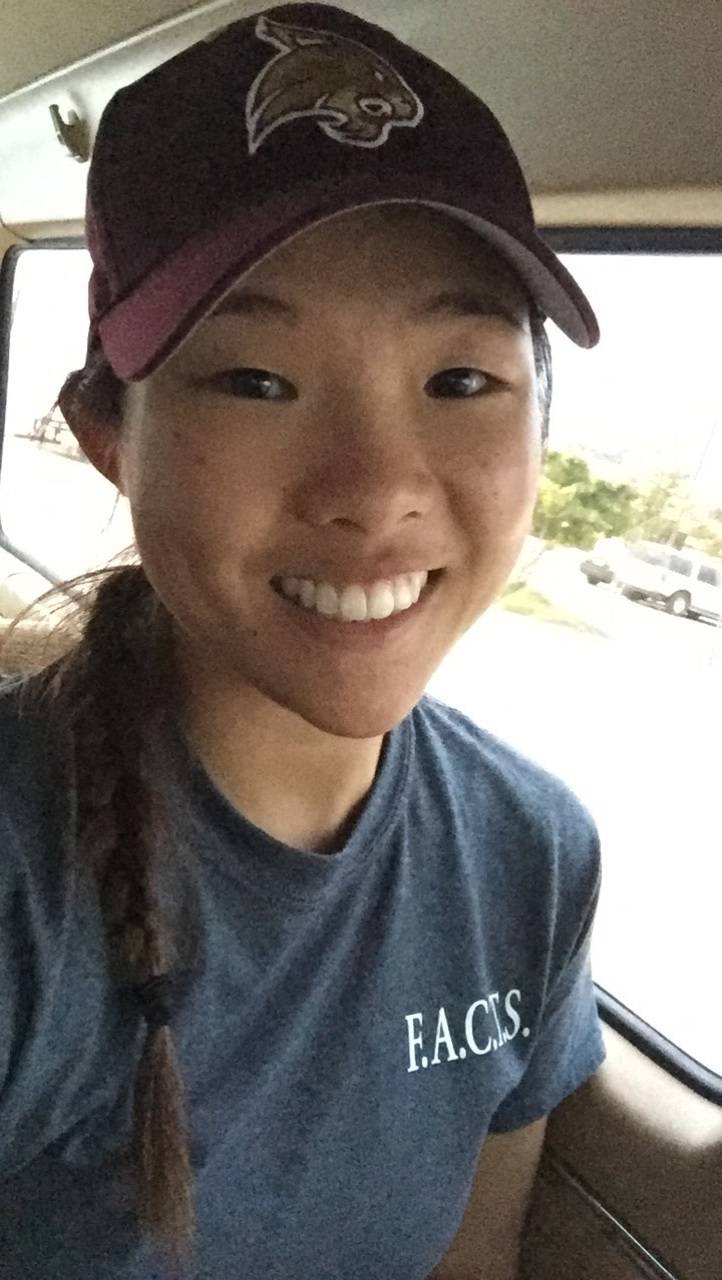 Congratulation to Elaine Chu (mentor Dr. Spradley) who was chosen by the Graduate College to compete for the 3MT regional competition in Knoxville, Tennessee in February 2019.
Congratulation to Elaine Chu (mentor Dr. Spradley) who was chosen by the Graduate College to compete for the 3MT regional competition in Knoxville, Tennessee in February 2019. Elaine is a biological anthropology master’s candidate focusing on body mass estimation of migrant Hispanic individuals and variation in stature and body mass within the Hispanic population. For the Texas State University 3MT competition, Elaine highlighted the utility of body mass estimation for unidentified individuals, specifically for cases involving multiple unidentified individuals with similar descriptions, such as Operation Identification at Texas State University. After graduation this May, Elaine will begin the doctoral program at the University of Nevada, Reno, where she will explore variation in subadult individuals from multiple populational groups.
For more information on the 3MT competition visit the University of Knoxville site.
-
Kilby family gift endows new Graduate Fellowship in Anthropology
The family of Michael Kilby has made a $100,000 gift to establish a permanent endowment in support of graduate research in anthropology.
Dr. Larry S. Kilby and Cheryl Kilby of North Wilkesboro, North Carolina, have worked with David Kilby, an associate professor of anthropology at Texas State University to establish this endowment in honor of Dr. J. Michael Kilby. David Kilby, Ph.D. is the younger brother of Michael Kilby, M.D.
-
FACTS well represented at 2018 American Academy of Forensic Sciences meeting
FACTS faculty and students present 15 talks/posters at 2018 AAFS meeting.
Workshop
Nicholas Herrmann | Data Standards, Archiving, and Analytics in Forensic AnthropologyPresentations
Audrey Schaefer and Jessica Galea | A Test of Quantitative Age-At-Death Estimation of the Pubic Symphysis Using the forAge Program
Kate Flor-Stagnato, Susan Sincerbox, and Nicholas Herrmann | Using Structure From Motion Photogrammetry to Quantify Volume Gain and Loss During the Human Decomposition Process
Kate Spradley | A Geometric Morphometric Analysis of Contemporary Hispanic Populations From Mexico and Colombia
Nandar Yukyi and Kate Spradley | Craniometric Variation of Modern Asian and Hispanic Individuals Using Multivariate Analysis
Kate Spradley | Validation, Verification, and Performance Checks of Anthropological Equipment and Software: The Importance of Quality Assurance in Forensic Anthropology Laboratories
Chaunesey Clemmons and Daniel Wescott | Dental Morphological Ancestry Estimation in a Self-Identified Biracial Sample
Kate Spradley | The Approach Toward Identification of Deceased Migrants in the United States and European Union: A Comparative Study Between LABANOF (Italy), OpID (Texas) and PCOME (Arizona) Experiences
Kate Spradley | Humanitarian Science in the Texas Borderlands: Incorporating a Sociopolitical Perspective to the Forensic Investigation of Migrant Identification
Robyn Kramer, Nicholas Herrmann, and Kate Spradley | The Application of Stable Isotopes and Geostatistics to Infer Region of Geographic Residence for Undocumented Migrants
Courtney Siegert, Michelle Hamilton, Elizabeth Erhart | The Application of Consolidation Materials to Burned Bone: A Comparative Approach
Elaine Chu and Kate Spradley | Body Mass Estimation: Preliminary Equations for the Undocumented South Texas Migrants Using Bayesian Inference
Shelby Garza and Daniel Wescott | Reexamining Differences in the Rate of Decomposition Between Previously Frozen and Never Frozen Human Remains Using the Accumulated Decomposition Score (ADS)
Krystle Lewis and Daniel Wescott | Assessing the Utility of Total Body Score (TBS) and Accumulated Degree Days (ADD) for Estimating Postmortem Interval (PMI) in Clothed Vulture-Scavenged Human Remains
Daniel Wescott | Taphonomic Effects on Isotope Ratios of Human Hair -
FACTS featured in Houston Chronicle
FACTS and Dr. Daniel Wescott were featured in the Houston Chronicle in an article titled Learning about decomposition at the body farm in San Marcos.
-
The Role of Hunting in Anthropogeny Symposium
Dr. Jill Pruetz is one of the invited speakers at the Role of Hunting in Human Evolution Symposium. This symposium will be live-streamed Friday, from 1:00-5:30 p.m. (West Coast time). Her lecture is entitled, "Hunting by Savanna Chimpanzees".
-
National Geographic video, "Just Like Us, These Chimps Splash in the River to Keep Cool" Highlights New Paper from Dr. Jill Pruetz
Dr. Pruetz's latest publication on the Fongoli chimpanzees' behavior in their savanna environment was featured in a National Geographic video.
-
Dr. David Kilby Awarded National Geographic Society Grant
Congratulations to Dr. David Kilby was was recently awarded a National Geographic Society grant in the amount of $17,850 in support of his project in South Texas, "A new look at Bonfire Shelter: Using Structure from Motion photogrammetry to investigate the earliest Americans.”
-
Research Enhancement Program Grants
Congratulations to these faculty who won 2018 Research Enhancement Program Grants.
- Dr. Britt Bousman, Early Later Stone Age Excavations at Erfkroon, South Africa
- Dr. Christi Conlee, Investigating Prehistoric Cultural Boundaries and Lifeways in North-Central Oregon
- Dr. Nick Herrmann, Ancient Eleon Bioarchaeological Project, Greece
- Dr. David Kilby, Investigations at Bonfire Shelter: New Dates for One of Americas Oldest Sites
-
Congratulations to Dr. Kate Spradley and everyone involved with Operation Identification
Dr. Kate Spradley and her team recently made the front page of USA Today for their work on Operation Identification.
-
Center for Archaeological Studies Featured for Veteran's Curation Program
University Marketing has a piece on the Veteran’s Curation Program (VCP) at the Center for Archaeological Studies (CAS). CAS curator, Amy Reid, who runs the program is featured, as are two of our students who are part of the program. Congratulations to Amy and Dr. Todd Ahlman worked very hard to bring VCP to the university. It’s wonderful to see the program flourishing.
-
Dr. Kate Spradley to deliver keynote address at TABA
Our own Dr. Kate Spradley will deliver the keynote address at the 2018 meeting of the Texas Association of Biological Anthropologists held on the Texas State Campus. This talk will be held on Friday, 11/9, at 6:00 in the Grady Early Building (1921 Old Ranch Road 12, San Marcos).
Dr. Spradley will be speaking about Operation ID: The Humanitarian and Human Rights Crisis in South Texas: Anthropological Application
Dr. Kate Spradley, Professor at Texas State University, is the founder and director of Operation Identification (OpID) established in 2013.
OpID provides humanitarian assistance to families of the missing and human rights assistance to migrants that die crossing the Texas/Mexico Border. The mission of OpID is to facilitate identifications and repatriations through community outreach, forensic anthropological analysis, and collaboration with governmental and non-governmental organizations. Dr. Spradley will discuss the applied anthropological aspects of OpID as well as research derived from studying migration from Latin America from a skeletal biology perspective.
-
Texas Association of Biological Anthropologists annual meeting at TXSU
The Texas Association of Biological Anthropologists (TABA) is a regional organization dedicated to biological anthropology including topics such as human variation, evolution and ecology; primate behavior, evolution and ecology; medical anthropology; forensic anthropology; anthropological genetics and related fields.
The 2018 meeting will be held on the campus of Texas State University on 11/9 - 10. We hope to see you there!
-
Dr. Lintz receives prestigious Plains Anthropological Society Distinguished Service Award
At the 2018 Plains Anthropological Conference in San Antonio October 26th, Dr. Chris Lintz, research associate in the Anthropology Department, received the society's Distinguished Service Award. The Distinguished Service Award is for outstanding lifetime achievement in Plains anthropological research, teaching, scholarship, and service to the profession. It goes to the people whose work is essential to our field, and is the most valued award given by the Plains Anthropological Society. The DSA has been awarded 23 times since initiated in 1991.
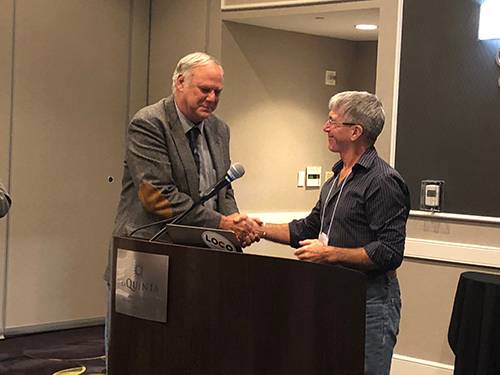
Dr. Doug Bamforth gives Dr. Chris Lintz Plains Anthropological Society Distinguished Service Award.
-
Dr. Jill Pruetz named Midwest Primatological Interest Group’s 2018 Distinguished Primatologist
The Midwest Primate Interest Group (MPIG) named Dr. Jill Pruetz the Distinguished Primatologist of 2018 based on her contributions to Primatologist in the Midwest. Pruetz received a doctorate at the University of Illinois in 1999, was a post-doc at the University of Miami of Ohio, and then worked as a professor of anthropology at Iowa State University from 2001 to 2017, when she returned to teach at her alma mater, Texas State University. She will give the keynote address at the annual MPIG meeting, which will be held in Bloomington, Indiana on October 26-27.
-
David Kilby interviewed on The Archaeology Show
Dr. David Kilby was a guest on The Archaeology Show and was interviewed regarding his research on the earliest North Americans.
The Archaeology Show podcast's 50th episode consists of interview and discussion with Dr. David Kilby regarding the peopling of the New World, Clovis archaeology, artifact caches, and the controversial Solutrean hypothesis for the origins of Clovis. The Archaeology Show is part of the Archaeology Podcast Network and is hosted by Chris Webster and April Kamp-Whittaker.
-
Dr. Christina Conlee to give Jeffrey Parsons Annual lecture at the University of Michigan
Dr. Christina Conlee will give the Annual Jeffrey Parsons Lecture at the University of Michigan Department of Anthropology on Oct. 25th; the talk is titled "Beyond the Lines: Exploring Long-Term Cultural Dynamics in Nasca, Peru."
-
Dr. Kilby's Work Featured by Texas State University
Dr. David Kilby and his work at Bonfire Shelter are featured on the Texas State home page! Congratulations to David and his graduate and undergraduate students, Janaka Greene, Sean Farrell, Ashley Eyeington and John Hedges.
-
Dr. Carolyn Boyd interviewed by the late Anthony Bourdain for his series “Parts Unknown”
Dr. Carolyn Boyd, Shumla Endowed Research Professor, was interviewed by the late Anthony Bourdain for his series “Parts Unknown” on the White Shaman panel. Carolyn will be featured on the October 21 episode on CNN.
-
Texas Archeological Society Annual Meeting
We are pleased to announce that Dr. Nick Herrmann has received a National Institute of Justice Award for his project "Investigation of subadult dental age-at-death estimation using transition analysis and machine learning methods,” for $898,550. Impressively, this was Nick’s first submission of this proposal.
From the grant description: "The goal of this research is to provide forensic practitioners with an accurate age estimation method based on a large, demographically diverse, modern subadult sample that captures the variation in dental development. Current standard methodology based on tooth mineralization often underestimates age by one to more than two years as age increases, an issue we aim to minimize. This research will use dental development data collected on radiographs from modern living subadults from different populations in the United States (US), the United Kingdom, and South Africa from birth to late teens. These samples include underrepresented populations, such as US Hispanics, that are lacking in the original publication samples because of a shift in population demographics since the methods were originally developed as compared to the present-day demographic profile of the US."
-
CAS's Jodi Jacobsen secures projects with National Park Service
Last summer, CAS's Associate Director, Jodi Jacobsen, submitted a proposal for a National Park Service Master Cooperative agreement contract, which she received. The NPS gave out a total of 25 awards, but only five of those went to “large” institutions who could handle projects in the $250,000 range, and CAS was one of the five. Project types are quite varied, and can include Archeological Identification/Evaluation Studies, Cultural Affiliation Study, Lineal Descent Studies to National Heritage Area Plans and Evaluations, and so on. This is not just a great opportunity for CAS, but it hopefully lead to NPS internships for undergraduate and graduate students.
-
CAS's curation facility expansion
CAS's curation facility expansion kicked off on Tuesday, September 25 and should be completed in four months. Due to Amy Reid’s hard work, CAS was recently recertified by the Texas Historical Commission to be a held-in-trust curation facility. Amy has also been working hard to also make sure that we meet federal curation standards set forth in 36 CFR 79, which will help us acquire and curate federal collections. Amy also was able to negotiate with the Texas Department of Transportation to extend our curation agreement with TxDOT through FY2020. The estimated total under this agreement for FY2019-FY2020 is $214,701.
-
CAS awarded three new projects thorough US CAS Army Corps of Engineers
Last year, CAS Director, Dr. Todd Ahlman, was awarded a five-year with the US CAS Army Corps of Engineers, which brought in over $2 million dollars in the first year. CAS was recently awarded new three projects through the agreement. On two projects they will team with Statistical Research Inc (SRI) to conduct archaeological surveys at the Barry M. Goldwater Range ($567,000) and Davis-Monthan Air Force Base ($720,000) in Arizona. The third project ($280,000) involves providing two staff members to support the cultural resources needs for Air Force Midwest installations and organizing a Native American consultation meeting with CAS's partner Stell Environmental.
-
Graduate Student Open House October 19th 10:00am-5:00pm
The Anthropology Department will be having an open house for anyone interested in our MA and PhD programs on October 19th 10:00am-5:00pm. All attendees are required to RSVP with the department by October 10, 2018 using our RSVP form.
-
The first class for the new PhD program in Applied Anthropology was held on September 4!
Texas State University is pleased to announce that the Texas Higher Education Coordinating Board and the Southern Association of Colleges and Schools Commission on Colleges has approved a new Doctor of Philosophy degree (Ph.D.) with a major in Applied Anthropology.
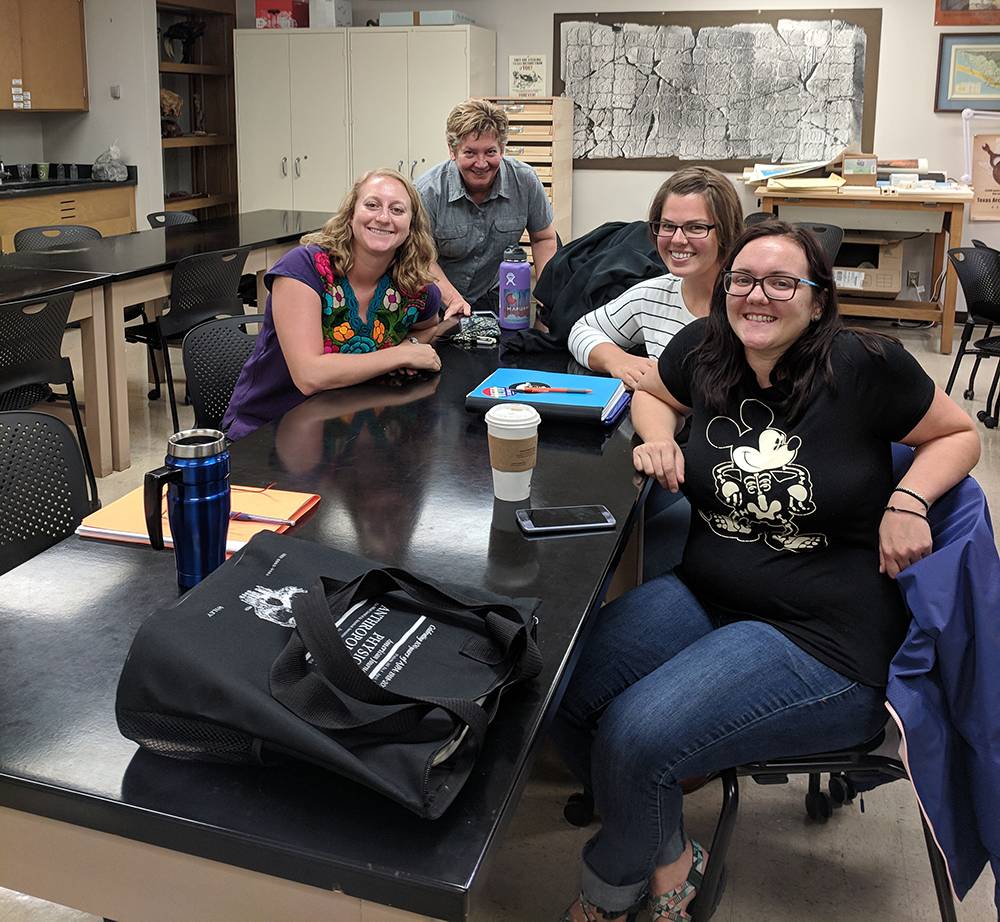 The program is the first applied anthropology doctoral program in the state of Texas and only the third in the nation! The Department of Anthropology at Texas State excels in two areas of applied anthropology: forensic anthropology and cultural resource management archaeology. Coursework in those areas incorporates intercultural communication, interdisciplinary understanding, research design, grant writing, project management, ethics and professional conduct, methods of data collection, and the use of theory in the interpretation of data. The global economy has created a tremendous need for research-based information and pragmatic uses of anthropological knowledge and skills, creating exciting and extensive career opportunities for applied anthropologists!
The program is the first applied anthropology doctoral program in the state of Texas and only the third in the nation! The Department of Anthropology at Texas State excels in two areas of applied anthropology: forensic anthropology and cultural resource management archaeology. Coursework in those areas incorporates intercultural communication, interdisciplinary understanding, research design, grant writing, project management, ethics and professional conduct, methods of data collection, and the use of theory in the interpretation of data. The global economy has created a tremendous need for research-based information and pragmatic uses of anthropological knowledge and skills, creating exciting and extensive career opportunities for applied anthropologists! -
Dr. David Kilby to address the Pre-Columbian Society of Washington, D.C.
Each year the Pre-Columbian Society of Washington, D.C. convenes six renowned scholars to present research and provide a panel discussion on an important theme in American archaeology. David Kilby has been chosen to present research on this years theme, the Peopling of the Americas. Dr. Kilby will present a lecture on Clovis caches and address their role in the controversial "Solutrean hypothesis" for European migration to the Americas during the last ice age. His lecture argues that North American and European caches are part of a larger global phenomenon in the late Pleistocene, but do not support a direct connection between Clovis and Solutrean populations.
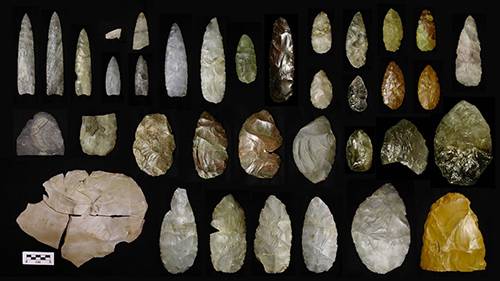
-
Dr. Emily Brunson interviewed by the CBC in Canada
Dr. Emily Brunson was interviewed about her research on why parents choose to vaccinate their children (or not) by the CBC in Canada on Friday in response the the measles outbreak in Europe this year. The World Health Organization reported "a record number of measles cases in Europe this year, with more than 41,000 people infected in the first six months of the year — almost double the total number of cases for 2017 — and of those, at least 37 people have died."
-
Dr. Kate Spradley is keynote speaker for first Human Rights and Dignity workshop in Falstad, Norway
Dr. Kate Spradley has been chosen as the keynote speaker for first Human Rights and Dignity workshop in Falstad, Norway on October 10, 2018. The right to seek and enjoy asylum from persecution (§14) is one of the fundamental rights of the Universal Declaration of Human Rights, which this year celebrates its 70th anniversary. However, the erection of border walls and fences along the US and European Union’s borders, and the adoption of stricter immigration policies severely curtails these rights and forces refugees and migrants to take ever greater risks in seeking refuge. Dr. Kate Spradley will discuss migrant deaths in Texas at the Falstad Center for Human Rights first workshop on Human Rights and Dignity.
-
Veterans Curation Program established at CAS
The Veterans Curation Program (VCP) recently established a new satellite lab at the Center for Archaeological Studies (CAS) in San Marcos, Texas. CAS is a research center within the Department of Anthropology at Texas State University. The lab will employ and train student veterans to rehabilitate artifact and archives collections from the Fort Worth District, U.S. Army Corps of Engineers. CAS’s Curator, Amy Reid, is a longtime admirer of the VCP and is proud to serve as lab manager. “I am so excited to give back to those who have sacrificed so much for our country. The VCP is such a great way to prepare veterans for the mainstream job market, especially student veterans who enroll in our University for that very reason.”
-
CAS | NSF REU: Exploring Globalization Through Archaeology and Bioarchaeology program
As part of this summer’s NSF REU: Exploring Globalization Through Archaeology and Bioarchaeology program, undergraduate students from Texas State and other universities spent 3 weeks doing fieldwork on Saint Eustatius, and 4 weeks on campus analyzing their data and writing up their project results. The students did a great job presenting their posters on August 2nd. Each student will also apply to present their research at the national Society for American Archaeology conference, which will be next April in Albuquerque.
This summer's work was directed by Ashley McKeown and Todd Ahlman.
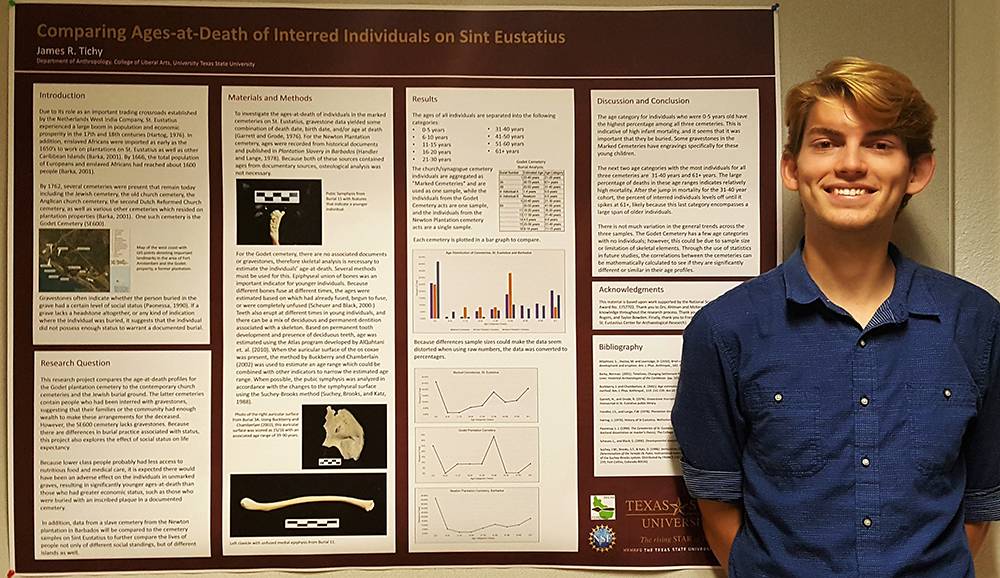
-
Dr. Christina Conlee awarded National Science Foundation Grant
Dr. Christina Conlee was awarded a NSF grant in the amount of $239,556 for her project titled "The Cyclic Rise and Fall of Complex Societies."
With funding from the National Science Foundation, Dr. Conlee will be conducting a multi-year archaeological project in the desert of Nasca, Peru. She will examine the development, expansion, and collapse of complex societies during the Middle Horizon (AD 650-1000), a time of unprecedented change when the highland Wari empire expanded into many areas of the Andes, including the south coast of Peru and home of the Nasca.
-
Dr. Todd Ahlman featured in Texas State University's HillViews Magazine article
The Air Force does not normally employ archaeologists and conservation specialists, so, to give the aviation experts a break from shovels and paperwork, last year Texas State University entered into a $1.6 million agreement to perform cultural resource surveys and support at Air Force installations in eight states. The agreement, made between the Integrated Natural and Cultural Resources Team (INCRT) and the United States Army Corps of Engineers (USACE), is part of a larger, potentially $45 million five-year cooperative agreement acquired in 2016 by Dr. Todd Ahlman, INCRT head and director of the Center for Archaeological Studies at Texas State.
You can read more about Dr. Ahlman and the project in HillViews Magazine.
-
